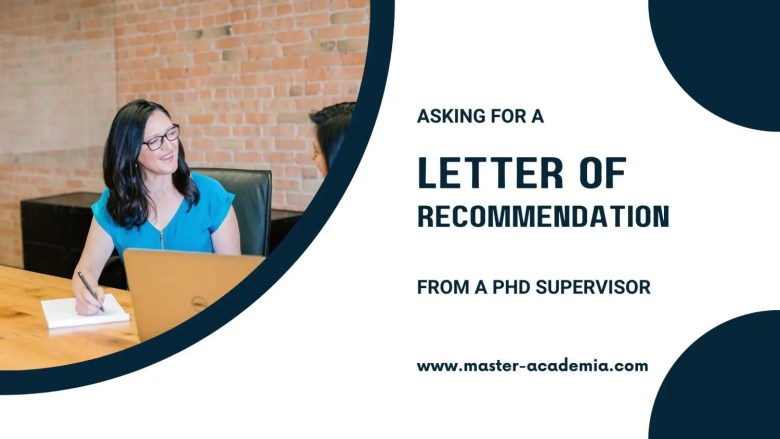
Letters of recommendation are required for many applications, and PhD supervisors are often asked to provide these letters to PhD students. How you ask your PhD supervisor, what support you provide, and how you deal with a difficult supervisor relationship, matters for the quality of recommendation letters.
Contents
- Reasons to need a recommendation letter from a PhD supervisor
- Asking for a recommendation letter from a PhD supervisor in person
- Asking for a recommendation letter from a PhD supervisor via email
- Offering to provide a draft when asking for a recommendation letter from a PhD supervisor
- Dos and don’ts when asking your PhD supervisor for a recommendation letter
- Dealing with a difficult relationship when needing a recommendation letter from a PhD supervisor
Reasons to need a recommendation letter from a PhD supervisor
There are various reasons to need a recommendation letter from a PhD supervisor. First, there are job applications.
PhD supervisors usually are some of the people who work most closely with a PhD student. Therefore, their opinion and feedback are valued for both academic and non-academic job applications.
However, especially for academic applications (such as postdoctoral positions), the PhD supervisor’s assessment of the student’s academic quality tends to be highly valued by application committees.
Letters of recommendation are often required for scholarship, grant and bursary applications. As many PhD students rely on these funding sources, a good recommendation letter from the PhD supervisor is really important in these instances.
Often, the recommendation letter is, next to the PhD student’s motivation letter, a key factor of success that can accelerate or slow down a PhD student’s career.
Asking for a recommendation letter from a PhD supervisor in person
Recommendation letters from PhD supervisors are important, and a lot is riding on them. So how do you ask for a letter? The best and easiest way is in person.
Things to consider when asking for a letter of recommendation in person:
- Timing: If you have a job or grant application in mind, it is important to mention it to your PhD supervisor well in advance. Avoid asking for a recommendation letter last minute at all costs!
- Requirements: Tell your PhD supervisor about your application plans, and ask if he/she is willing to write a recommendation letter. Be specific about the requirements (length, points to cover, deadline, etc.) of the letter, so that your PhD supervisor knows exactly what to expect.
- Content: Letters of recommendation should never be generic. Therefore, always suggest key points to include in the letter. Don’t be shy. Providing direction in terms of the content of the letter makes it easier for your PhD supervisor to complete the task, and ensures that each recommendation letter is tailored to the specific application. And it does not mean that your PhD supervisor has to take over all your suggestions.
- Email confirmation: PhD supervisors tend to be busy, and they may forget about your letter. Even after agreeing that your PhD supervisor writes a recommendation letter for you, make sure to put this agreement, including the deadline and key points to include, into writing by sending an email.
- Friendly reminder: If you have not received your recommendation letter and your deadline is approaching, send a friendly reminder. Acknowledge that your supervisor is probably very busy, thank him/her for supporting you, and once again offer to help with drafting the actual letter.
Asking for a recommendation letter from a PhD supervisor via email
Not all PhD students see their supervisors regularly and have the opportunity to ask for a recommendation letter in person. You can also ask for a recommendation letter via email.
When asking for a recommendation letter via email, it is extremely important to be concrete and concise.
The main reason for this is that you cannot explain elaborately what the application is about, why you need to letter or answer any direct questions when you ask your supervisor via email. And you don’t want your request to drown in an essay-long email.
Things to consider when asking for a letter of recommendation via email:
- Email subject: Make sure to be explicit about your request in the email subject. For instance: “Kind request for a recommendation letter for x application”.
- Purpose: Start your email by explaining why you need a recommendation letter in 2-3 sentences. Instead of talking about all the details, you can attach the job description or call for applications to your email, and simply refer to it in text.
- Requirements: Tell your PhD supervisor about your application plans, and ask if he/she is willing to write a recommendation letter. Be specific about the requirements (length, points to cover, deadline, etc.) of the letter, so that your PhD supervisor knows exactly what to expect.
- Content: Letters of recommendation should never be generic. Therefore, be explicit about the requirements of the application, and suggest key points to include in the letter. Don’t be shy. Providing direction in terms of the content of the letter makes it easier for your PhD supervisor to complete the task, and ensures that each recommendation letter is tailored to the specific application. And it does not mean that your PhD supervisor has to take over all your suggestions.
- Friendly reminder: If you have not received your recommendation letter and your deadline is approaching, send a friendly reminder. Acknowledge that your supervisor is probably very busy, thank him/her for supporting you, and once again offer to help with drafting the actual letter.
If you are struggling to formulate such an email, have a look at 5 sample emails asking for letter of recommendation from a professor.
You may also like: Sample emails asking for letter of recommendation from a professor
Offering to provide a draft when asking for a recommendation letter from a PhD supervisor
Having students write their draft letters of recommendation is a widespread practice in academia. While it may seem weird at first, offering to provide a draft recommendation letter about yourself can be a good idea.
Some PhD supervisors are of course completely committed to their supervisees and will take the time to write a unique, tailor-made recommendation letter each time they are asked to do so.
In reality, however, PhD supervisors are extremely busy and get multiple requests for recommendation letters regularly. Not only from PhD students but also from bachelor bachelor’s and master’s students.
Providing a draft letter, or key points to include or highlight, can ensure that the recommendation letter is on point, and addresses all relevant aspects of the application.
Therefore, many supervisors will request a draft version from you anyways. Many others will appreciate your offer of writing a first draft. Editing and adding opinions here and there is much easier for PhD supervisors than writing a recommendation letter from scratch.
In my experience, the chance that a PhD supervisor agrees writing a recommendation letter is much higher when the PhD student offers the provision of a draft.
You may also like: 3 sample recommendation letters for brilliant students
Dos and don’ts when asking your PhD supervisor for a recommendation letter
To summarise the information above, here are the key dos and don’ts when asking your PhD supervisor for a letter of recommendation.
Dos:
- Ask your supervisor for a recommendation letter well in advance of the application deadline
- Be clear about the purpose and requirements for the letter
- Offer to write a draft letter yourself, or to provide key points to include
- Give your PhD supervisor a concrete deadline
- Ensure that each recommendation letter is tailored to the specific application
Don’ts:
- Ask your supervisor last minute, or too close to the deadline
- Be vague about the content that you’d like to have included in the letter
- Leave the content of the letter entirely up to your supervisor
- Expect your supervisor to remember the letter and the dates of submission
- Submit a generic letter of recommendation as part of your application
Dealing with a difficult relationship when needing a recommendation letter from a PhD supervisor
Not every PhD student has a good or convivial relationship with his or her PhD supervisor/s. Thus, there may be some difficult situations.
If you think that your PhD supervisor will not put a lot of effort into the letter (because of a lack of time or interest), you can often mitigate the situation by providing a good draft. Make sure to inquire first if they are okay with you providing a draft. You cannot control the content of the final letter, but you can certainly steer it.
If you think your PhD supervisor will provide a very negative recommendation letter, it is better not to ask for one. Most applications do not explicitly ask for a recommendation letter from the PhD supervisor. So try to ask someone else, for instance, a good colleague, the head of the department, or someone else you collaborate with.
If you have a bad relationship with your PhD supervisor but your application explicitly asks for a letter of recommendation letter from that PhD supervisor, you have two options:
- Do include the recommendation letter of the PhD supervisor, even if it is a negative one, and provide an additional explanation about your relationship. Furthermore, provide positive recommendation letters from other people, even if they are not required, to counterbalance the negative opinion of the PhD supervisor.
- Do not include a recommendation letter from the PhD supervisor, even if the application requires one. Explain why you decided not to include this specific recommendation letter, and provide alternatives.
The latter two scenarios are not ideal and should be a last resort.



